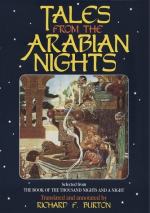[FN#364] i.e., unto Him we shall return, a sentence recurring in almost every longer chapter of the Koran.
[FN#365] Arab. “Kun,” the creative Word (which, by the by, proves the Koran to be an uncreated Logos); the full sentence being “Kun fa kana” = Be! and it became. The origin is evidently, “And God said, Let there be light: and there was light” (Gen. i. 3); a line grand in its simplicity and evidently borrowed from the Egyptians, even as Yahveh (Jehovah) from “Ankh"=He who lives (Brugsch Hist. ii. 34).
[FN#366] i.e. but also for the life and the so-called “soul.”
[FN#367] Arab. “Layali"=lit. nights which, I have said, is often applied to the whole twenty-four hours. Here it is used in the sense of “fortune” or “fate ;” like “days” and “days and nights.”
[FN#368] Abdullah ibn al-Zubayr a nephew of Ayishah, who had rebuilt the Ka’abah in A.H. 64 (A.D. 683), revolted (A.D. 680) against Yezid and was proclaimed Caliph at Meccah. He was afterwards killed (A.D. 692) by the famous or infamous Hajjaj general of Abd al-Malik bin Marwan, the fifth Ommiade, surnamed “Sweat of a stone” (skin-flint) and “Father of Flies,” from his foul breath. See my Pilgrimage, etc. (iii. 192-194), where are explained the allusions to the Ka’abah and the holy Black Stone.
[FN#369] These lines are part of an elegy on the downfall of one of the Moslem dynasties in Spain, composed in the twelfth century by Ibn Abdun al-Andalusi. The allusion is to the famous conspiracy of the Kharijites (the first sectarians in Mohammedanism) to kill Ah, Mu’awiyah and Amru (so written but pronounced “Amr”) al-As, in order to abate intestine feuds m Al-Islam. Ali was slain with a sword-cut by Ibn Muljam a name ever damnable amongst the Persians; Mu’awiyah escaped with a wound and Kharijah, the Chief of Police at Fustat or old Cairo was murdered by mistake for Amru. After this the sectarian wars began.
[FN#370] Arab. “Sarab"= (Koran, chaps. xxiv.) the reek of the Desert, before explained. It is called “Lama,” the shine, the loom, in Al-Hariri. The world is compared with the mirage, the painted eye and the sword that breaks in the sworder’s hand.
[FN#371] Arab. “Dunya,” with the common alliteration “daniyah” (=Pers. “dun"), in prose as well as poetry means the things or fortune of this life opp. to “Akhirah"=future life.
[FN#372] Arab. “Walgh,” a strong expression primarily denoting the lapping of dogs; here and elsewhere “to swill, saufen.”
[FN#373] The lines are repeated from Night ccxxi. I give Lane’s version (ii. 162) by way of contrast and—warning.
[FN#374] “Sahirah” is the place where human souls will be gathered on Doom-day: some understand by it the Hell Sa’ir (No. iv.) intended for the Sabians or the Devils generally.
[FN#375] His eyes are faded like Jacob’s which, after weeping for Joseph, “became white with mourning” (Koran, chaps. xxi.). It is a stock comparison.




